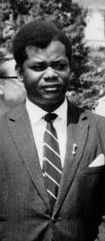Oscar Kambona
| Oscar Kambona | |
|---|---|
 |
|
| 1st Minister of External Affairs | |
|
In office 1963–1966 |
|
| President | Julius Nyerere |
| Succeeded by | Chedial Mgonja |
| Personal details | |
| Born |
13 August 1928 Mbinga District, Tanganyika |
| Died | July 1997 (aged 69) London, United Kingdom |
| Resting place | Tanzania |
| Nationality | Tanzanian |
| Political party | TADEA |
| Other political affiliations |
Tanganyika African National Union |
| Spouse(s) | Flora Moriyo |
| Children | Mosi Neema |
| Alma mater | Middle Temple |
| Religion | Anglicanism |
Oscar Salathiel Kambona was the first Minister of Foreign Affairs of Tanganyika. He is the second most influential and most popular leader in the country after President Julius Nyerere.
Kambona was born on 13 August 1928 on the shores of Lake Nyasa in a small village called Kwambe near Mbamba Bay in the district of Mbinga near Songea in southern Tanganyika. He died in London in July 1997.
He was the son of the Reverend David Kambona and Miriam Kambona. Reverend David Kambona belonged to the first group of African priests to be ordained into the Anglican Church of Tanganyika.
Kambona received his primary school education at home under a mango tree in his home village. The tree still stands today. He was taught by his parents and by an uncle, all of whom were teachers.
He was then sent to St Barnabas Middle School in Liuli in southern Tanganyika not far from his home. He also attended Alliance Secondary School in Dodoma in central Tanganyika.
A British Anglican bishop paid Oscar Kambona's school fees because his father could not afford to do so. The school fees were 30 Pounds per year. Kambona is reported to have said he convinced the Anglican bishop to pay his school fees by reciting the Lord's Prayer in English.
He was then selected to attend Tabora Boys’ Senior Government School where he first met Julius Nyerere who was already teaching at St. Mary's, a Catholic school in the town of Tabora.
Kambona became the secretary-general of the Tanganyika African National Union (TANU) during the struggle for independence and worked closely with Nyerere who was president of TANU, the party which led Tanganyika to independence. Tanganyika won independence from Britain on 9 December 1961. The two were the most prominent leaders of the independence movement in Tanganyika in the 1950s.
Oscar Kambona was a charismatic leader who also had great influence among the leaders of the African liberation movements based in Dar es Salaam, Tanzania, second only to Nyerere, after the country won independence.
He was a shining star in the constellation of Tanganyikan (later Tanzanian) politicians and it was widely believed that he would be the next president of the country if Nyerere no longer ran for office or stepped down for whatever reason. His stature as Nyerere's heir apparent or successor was enhanced when, as defence minister, he calmed down soldiers who could have overthrown the government.
That was during the army mutiny in January 1964 when President Nyerere and Vice President Rashidi Kawawa were taken to a safe place by the members of the intelligence service in case the soldiers wanted to harm them.
...
Wikipedia
